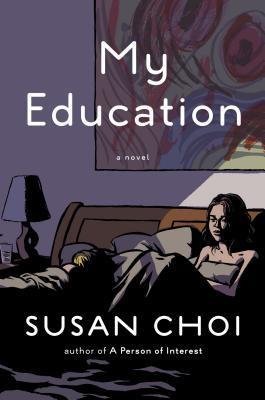If you’re still hunting for something to read this summer, look no further. Susan Choi’s “My Education” is a chaise-lounge literary page-turner par excellence: sexy, smart, well-plotted, jammed with observations witty and profound, and so well-written it occasionally leaves you gasping.
If, like me, you haven’t read her earlier novels, which landed Choi finalist spots for both the Pulitzer and the PEN/Faulkner prizes, you may want to drop everything and spend the rest of July and August with her, too. These earlier works — “The Foreign Student,” “American Woman” and “A Person of Interest” — have radically different subject matter than the current one, but once you experience Choi’s prose style, you’ll be ready to read her grocery lists.
I guess I’m in love. And so is the protagonist of “My Education,” Regina Gottlieb. In 1992, Regina arrives on the campus of a Cornell-like university as a graduate student in writing. The first week she catches sight of the notorious professor Nicholas Brodeur. “He wore a long duster coat, in the heat of September. His filthy blond hair stuck up and out in thatchy spikes from heavy use of some kind of pomade, as if it were 1982, not ’92, and he wore Lennon shades with completely black lenses, as if it were outdoors, not in, and overall, in his resemblance to a Joy Division poster, he comported himself as if twenty and not, as I’d come to find out, almost forty.”
Intrigued beyond reason, Regina signs up for Brodeur’s advanced seminar in Chaucer, a subject about which she knows nothing and which she attends in a get-up she describes as “Catwoman of Academe.” (I believe I wore this same outfit to a Russian history class I took in my first semester at college, and for the same reasons.) Despite her novice status, Regina ends up becoming Brodeur’s teaching assistant and is soon after invited to a dinner party at his house. At this Bu?-worthy event, at which the guests drink a case of wine before any food appears, Regina meets Brodeur’s wife, Martha Hallett. In a shocking twist, the two end up making out in the solarium.
As she moves into the Brodeur-Hallett orbit, Regina takes with her the fourth character in this love-square (like a love triangle, only more complicated). That is her housemate, the completely unforgettable Dutra, on whom I developed a furious Pygmalion-style crush. Daniel Dutra is a good-looking, gangly, know-it-all, obsessive-compulsive pothead med student.
When his role as Regina’s casual sex partner is superseded, Dutra rides Tonto-like with her into the fray. When she feels she should move out, he spearheads her apartment hunt, helping her buy a fish so she won’t be lonely, “highlighting passages from ‘Saltwater Tank Manual,’ a joint pinched in his lips.” When she drops out of school to spend all her time with her lover, he attends daylong bar crawls as a billiards partner and beard.
Disastrous and extremely erotic complications ensue.
The second part of the book is set 15 years later, in 2007. Despite a bit of awkward catching-up with the characters and an abrupt walk-on of the events of Sept. 11 — fiction, like real life, is still struggling with this disruption — the section not only resolves the plot but deepens and clarifies the meaning of the narrative. With Regina’s epiphany comes the acknowledgment of the book’s true subject: youth itself, its power, its ardor, its heedlessness, its stupidity, its magnetism. Any cautionary messages in this tale are no match for its sheer exhilaration.
Send questions/comments to the editors.



Success. Please wait for the page to reload. If the page does not reload within 5 seconds, please refresh the page.
Enter your email and password to access comments.
Hi, to comment on stories you must . This profile is in addition to your subscription and website login.
Already have a commenting profile? .
Invalid username/password.
Please check your email to confirm and complete your registration.
Only subscribers are eligible to post comments. Please subscribe or login first for digital access. Here’s why.
Use the form below to reset your password. When you've submitted your account email, we will send an email with a reset code.